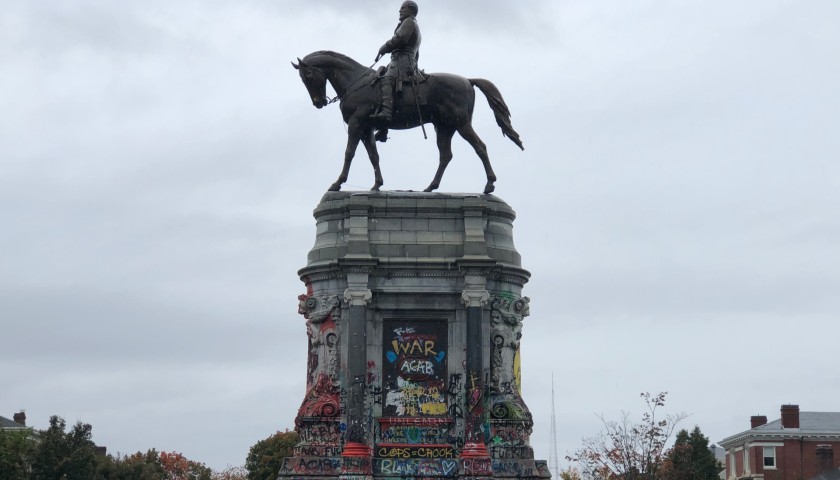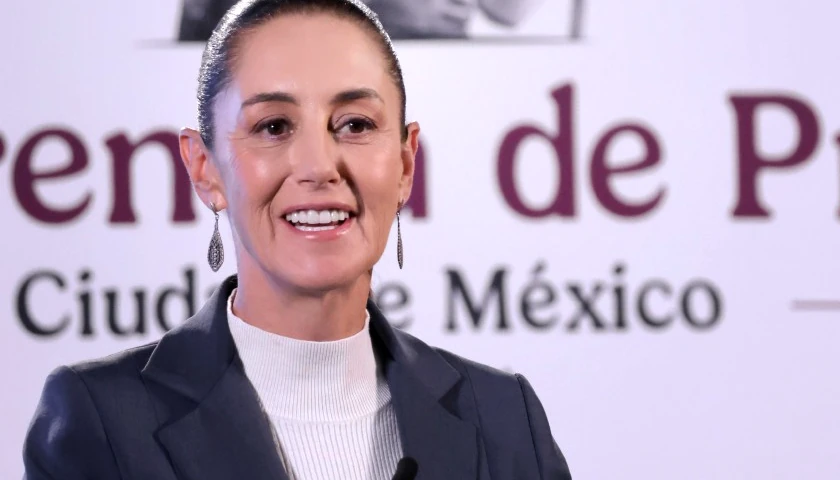The Virginia Supreme Court dissolved injunctions blocking the removal of the Robert E. Lee monument in Richmond, according to an opinion and an order published by the court on Thursday. In June 2020, Governor Ralph Northam ordered the removal of the monument, which sits on a small piece of land owned by Virginia in the middle of Richmond. Courts issued injunctions to prevent removal while considering two lawsuits challenging the legal authority to remove the monument.
In Taylor v. Northam, plaintiffs argued that documents from the late 1800s prevent the removal. But the court said that the restrictive covenants are unenforceable and said that they unreasonably try to force government speech indefinitely.
“Assuming arguendo that the Taylor Plaintiffs are correct in claiming that the language in the 1887 Deed and the 1890 Deed created restrictive covenants, those restrictive covenants are unenforceable as contrary to public policy and for being unreasonable because their effect is to compel government speech, by forcing the Commonwealth to express, in perpetuity, a message with which it now disagrees. For the reasons stated, we hold that the circuit court did not err in concluding that the purported restrictive covenants are unenforceable, that Governor Northam’s order to remove the Lee Monument did not violate the Constitution of Virginia, and that all of the Taylor Plaintiffs’ claims are without merit,” the court said in Taylor.
In Gregory v. Northam, William Gregory argued that he is an heir of the original owners of the land and has a right to block the removal. But the Supreme Court upheld the circuit court’s determination that Gregory has no property right, and its dismissal of the case with prejudice, meaning it can’t be re-filed. Richmond firm Blackburn, Conte, Schilling and Click, P.C. represented the case, and declined to provide comment. Taylor was not dismissed with prejudice. Attorney Patrick McSweeney did not respond to a request for comment by press time.
At a press conference, reporters asked Attorney General Mark Herring if the cases could be appealed to the U.S. Supreme Court. He said, “I don’t think there’s any legal basis for an appeal to the U.S. Supreme Court, but I will say this, if they try, we will be here to oppose it. This statue is coming down.”
It’s not clear when the monument will be removed, but an announcement from the governor’s office on Thursday said removal of the statue will be a multi-day process and isn’t expected to occur this week. The Department of General Services said the removal date and public viewing information will be announced later, with more information to be posted on Twitter and Facebook.
Senator Jennifer McClellan (D-Richmond) said in a Twitter statement, “I pass the Lee monument each time I drive to work to serve the people of Virginia and move our Commonwealth forward. The statue represents trauma for the Black community. It’s about time we removed this statue. When it went up in 1890, John Mitchell, Jr. wrote that it would bequeath to the future a ‘legacy of treason and blood,’ it was a symbol meant to deter racial progress and that it ‘forge[d] heavier chains with which to be bound.’ I’m glad to see the statue go. But we must continue to dismantle the legacy of slavery and white supremacy that remain woven into all our systems: education, housing, transportation, and justice. We’ve begun that work but have a long way to go.”
Richmond Mayor Levar Stoney received national praise for removing Confederate monuments on city property in 2020, a boost to his reputation after criticism from Black Lives Matter activists and others over handling of protests and riots in 2020.
Northam and Herring celebrated the Virginia Supreme Court’s decision to allow the removal of the monument. Northam was listed as the defendant in the lawsuits, and Herring’s office handled the defense of the case. Both faced blackface scandals in 2019.
“Today’s ruling is a tremendous win for the people of Virginia. Our public memorials are symbols of who we are and what we value. When we honor leaders who fought to preserve a system that enslaved human beings, we are honoring a lost cause that has burdened Virginia for too many years,” Northam said in his announcement. “I am grateful to Attorney General Mark Herring, my former counsel Rita Davis, and all those who worked so hard for this victory. This ruling is an important step towards moving the Commonwealth of Virginia and the City of Richmond forward into a more inclusive, just future. Today it is clear—the largest Confederate monument in the South is coming down.”
In a press release, Herring said, “For too long we allowed our communities to be dominated by symbols of white supremacy and hate that did not represent who we had become as Virginians. The Lee statue has stood as a daily reminder of a racist past, but we cannot let that history define the Virginia of today and the Virginia of tomorrow. The monuments we raise and the symbols we include in our communities create a certain narrative, but up until now that narrative has been one-sided – and it’s time to tell our full story.”
Senator Amanda Chase (R-Chesterfield) said the monument should remain in place and other monuments that have already come down should be put back, although she said new monuments could be added if funded by private organizations. She suggested Booker T. Washington for one new monument.
“I would respect the context that which was the era in which these monuments were erected. They do bring in revenue for the state. It’s a national landmark, and people can choose to visit the monuments or not,” Chase said. “And I would also choose to add to that the history from today.”
Chase said, “[The Lee monument] is art, and part of the First Amendment is preserving people’s creative rights. We just have to be more tolerant as a society,” Chase said. “It’s a sad day in history when they just indiscriminately take down some history but leave some of it up.”
– – –
Eric Burk is a reporter at The Virginia Star and The Star News Network. Email tips to [email protected].








